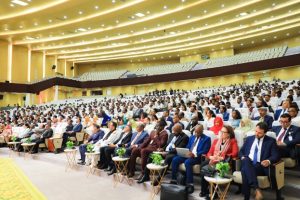
As the global population continues its upward trajectory, the composition of the workforce remains a pivotal factor in economic development. This demographic shift has ignited a vigorous debate among theorists, with opposing viewpoints clashing over the implications of population growth. Critics express concern that finite resources will inevitably lead to scarcity as population numbers swell. Conversely, proponents argue that population growth fosters innovation, expands the workforce, and generates other beneficial outcomes.
Africa, in particular, possesses a vast, largely untapped youth resource, a demographic dividend with the potential to reshape the continent’s future. Recognizing this potential, stakeholders are urging African governments to create enabling environments that empower young people to contribute meaningfully to their nations’ progress.
The summit has attracted prominent figures, including youth affairs ministers from across Africa, intellectuals and senior government officials, all converging to amplify the voices of Africa’s youth. The core objective is to significantly boost the involvement of young Africans in the pursuit of sustainable peace and prosperity across the continent, with a strong emphasis on fostering Pan-Africanism.
Ethiopia’s President Taye Atske-Selassie, in his opening address, underscored the historical context of Africa’s struggle for freedom and equality, reminding attendees of the sacrifices made by past leaders in the fight against colonial oppression. “Africa’s quest for freedom and equality laid the foundation for the African Union,” he stated.
He urged the youth to honor this legacy by driving development and peace through wisdom and knowledge, emphasizing the need for solutions rooted in these principles to address challenges like unemployment, climate change and political instability.
President Taye emphasized the critical role of youth in navigating the complexities of the modern world, stating, “Young leaders are expected to generate ideas and make decisions that are relevant to the changing global geopolitics.”

He also noted Africa’s need to focus on harnessing technology, innovation, quality education, and skill development as catalysts for progress, emphasizing the importance of investing heavily in entrepreneurship and innovation to foster job creation and African-driven solutions.
President Taye called on African Union and other stakeholders to elevate efforts in empowering African youth as the engines of development and urged the private sector to exert their corporate social responsibility.
He further underlined that leadership should focus on transforming the ideas of African youth into tangible actions to fully unlock their power. Nonetheless, the President pointed out that youths are still confronting unemployment, access to vital education, and health care.
Moreover, he highlighted that the growing digital divide and the destructive impacts of climate change and environmental degradation are major issues that need to be addressed, as well as political instability and conflicts. He added that the continent needs to integrate its resources into the global value chain. With the world’s youngest and fastest-growing population, abundant raw materials, and holistic progress, the continent is witnessing the potential being realized and the success of young African entrepreneurs making significant contributions across various sectors.
According to him, the digital startups showcased demonstrate that Africa is strategically positioning its youth in emerging fields, including biotechnology, financial technology, and the green economy. He added that it is also another testament that the youth will meaningfully drive the successful implementation of AfCFFA.
Echoing this sentiment, Ethiopia’s Minister of Women and Social Affairs, Ergoge Tesfaye, highlighted the demographic power of Africa’s youth. “With over 70 percent of our population under the age of 30, we are a continent that must recognize and embrace the power of its youth, who are the powerhouse of Africa and leaders of the present and future,” Minister Ergoge asserted.
She acknowledged the significant challenges young Africans face, including unemployment, poverty, climate change, political instability, and health issues, but urged resilience and proactive engagement.
“These challenges must not deter us. Rather, they should ignite our potential to empower and uplift our youth by providing them with education, resources, and opportunities they rightly deserve.”
Minister Ergoge also reaffirmed Africa’s commitment to unity and progress, aligning with the goals of Agenda 2063—the African Union’s strategic framework for the socio-economic transformation of the continent. “As we engage in discussions under the banner of Pan-Africanism, let us reaffirm our collective commitment to unity, solidarity, and progress,” she stated.
The African Union Special Envoy on Youth, Chido Mpemba, further emphasized the urgency of unified action. “If we truly want to build the Africa that we want, then we must become the generation that speaks with one voice, not because we must agree on everything, but because we must agree on one thing: Africa’s future must be shaped by Africans,” Mpemba declared
She stressed the need for action beyond rhetoric, highlighting that Africa does not lack ideas or strategies, but rather “consistent collective action.” “Africa cannot keep saying it is the future while outsourcing that future to others. If we want economic prosperity, we must break out of working in silos.”
Mpemba also drew attention to the African Continental Free Trade Area (AfCFTA), emphasizing that its potential remains untapped if young Africans continue to face barriers in cross-border business. “We need Pan-African youth enterprises, cross-border startups, and policies that empower our generation to engage in trade. We have seen glimpses of this potential—when young Africans collaborate, real change happens,” she asserted.
The summit recognizes the demographic dividend of Africa’s young population, projected to be the world’s youngest and fastest-growing in the coming decades. Harnessing this potential is crucial for economic growth and social progress. However, addressing the challenges faced by young people, such as unemployment and limited opportunities, is essential to prevent instability and ensure sustainable development.
More than just a conference, the summit is envisioned as a movement to foster cross-border collaborations and instill the spirit of Pan-Africanism among emerging leaders, aiming to significantly enhance the participation of African youth in building a prosperous and peaceful continent. The summit is anticipated to play a pivotal role in solidifying Pan-Africanism among Africa’s youth, shaping the continent’s trajectory for generations to come.
BY EYUEL KIFLU
THE ETHIOPIAN HERALD SUNDAY EDITION 6 APRIL 2025





